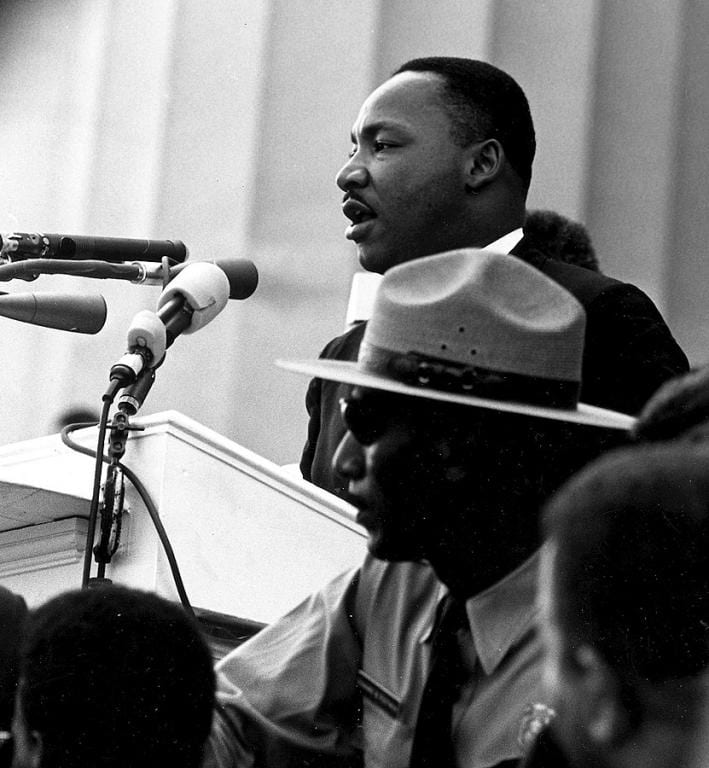
One might think Martin Luther King, Jr. would have viewed the universe as unfriendly. All one has to do is consider how much racial hatred he endured. And yet, King was convinced otherwise: “It is quite easy for me to think of the universe as basically friendly.” Why? He gives a few reasons: “Mainly because of my uplifting hereditary and environmental circumstances.” [1] This is not to say that King refused to acknowledge the extreme difficulties and opposition he and the African American community endured in their pursuit of freedom and his vision of the Beloved Community. He refused to allow negative experiences to distort his vision of God’s love and justice that will ultimately prevail. Nor did he permit a naive optimism to mask the present hard reality. In fact, as noted in a recent entry, King even struggled mightily with depression based on a variety of factors.
King’s struggle with depression, as documented in that prior blog post, should by no means reduce his significance and lessen our respect, but rather increase them in our eyes. Why? King faced great internal and external struggles, yet was resilient. His resilience was not fueled by a certain power-of-positive-thinking projectionism whereby he forced himself to believe happy thoughts about the universe being a friendly place. Rather, his perspective on life was grounded in a belief in the objective reality of a good and just universe centered in the God revealed in Jesus Christ.
One of my favorite commentators on Dr. King is Prof. Rufus Burrow, Jr. In his book, God and Human Dignity, Burrow writes of King’s theistic personalism: “King’s deepest faith was in a personal God of love and reason who is the creator and sustainer of all life…King perceived such a God to be infinitely loving, caring, responsive, active, righteous, just, and on occasion, wrathful” (as in the vein of the Old Testament prophets who cried out against injustice and unrighteousness). [2] Later, Burrow writes, “The God of the universe, the God of Jesus Christ, was the reason behind all that King committed himself to in the civil and human rights movement and his decision to break silence on the war in Vietnam.” For King, it is not enough to operate on the horizontal level. It is not sufficient to love self, others, and the whole of creation. One must move beyond them–“length and breadth”–to include “height.” “Height” involves being vitally connected to the personal ground of all being, namely the God of Jesus Christ. Otherwise, we remain “earth-bound,” as King claimed in “Three Dimensions of a Complete Life.” [3] King’s unflinching conviction of the God revealed in Jesus as the objective personal ground to the moral order of the universe is “fundamental to understanding his theological social ethics.” This God and this moral ground to the universe fueled King’s efforts and confidence in the attainment of the Beloved Community against all odds: “King’s conviction that an objective moral order exists is the ground of his doctrine of the beloved community and his expectation of its attainment. In other words, it is possible to actualize the beloved community precisely because it is based on the principle that the universe itself is friendly and therefore supports the realization of such a community.” [4]
King famously remarked in his sermon on the Vietnam War that “the moral arc of the universe is long but it bends toward justice.” Given that we celebrate King with a national holiday and streets named in his honor in many cities across this country, it is easy to forget that King was an “inconvenient hero,” as Vincent Harding argues, or as the movie “King in the Wilderness” documents. If we are truly honest with ourselves as a nation today, King is still inconvenient. We should not seek to tame his radical vision of nonviolent love, using him in whatever way seems convenient politically. Nor should we try and turn him into a secular prophet who only accounted for the horizontal dimensions of life and love. If we would follow King into the wilderness and participate in his particular vision of the beloved community and its realization, we must keep in mind what he was up against, embracing the struggle, while being convinced that the God revealed in Jesus is the transcendent ground who makes possible a friendly universe.
_______________
[1] Martin Luther King, Jr., “An Autobiography of Religious Development,” in The Papers of Martin Luther King, Jr., vol. 1, ed., Clayborne Carson (Berkeley: University of California Press, 1992), page 360.
[2] Rufus Burrow, Jr., God and Human Dignity: The Personalism, Theology, and Ethics of Martin Luther King, Jr. (Notre Dame, IN: University of Notre Dame Press, 2006), page 102.
[3] Ibid., 241.
[4] Ibid., 184.












